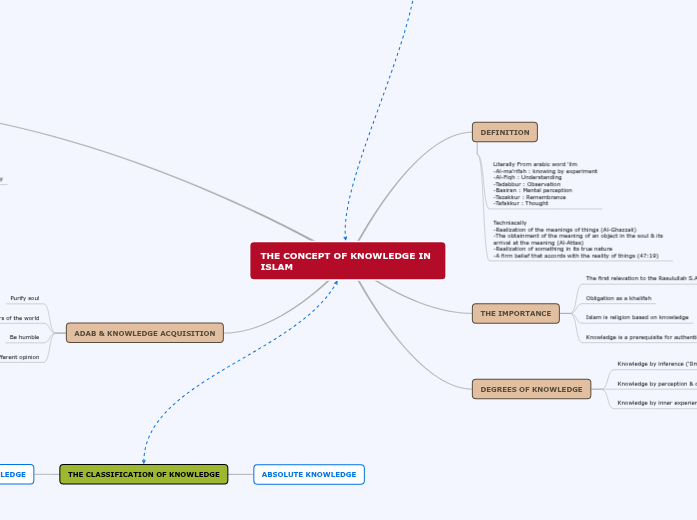THE CONCEPT OF KNOWLEDGE IN ISLAM
DEFINITION
Literally From arabic word 'ilm
-Al-ma'rifah : knowing by experiment
-Al-Fiqh : Understanding
-Tadabbur : Observation
-Basiran : Mental perception
-Tazakkur : Remembrance
-Tafakkur : Thought
Techniacally
-Realization of the meanings of things (Al-Ghazzali)
-The obtainment of the meaning of an object in the soul & its arrival at the meaning (Al-Attas)
-Realization of something in its true nature
-A firm belief that accords with the reality of things (47:19)
THE IMPORTANCE
The first relevation to the Rasulullah S.A.W
Obligation as a khalifah
Islam is religion based on knowledge
Knowledge is a prerequisite for authentic peace
DEGREES OF KNOWLEDGE
Knowledge by inference (‘Ilm al-Yaqin)
Knowledge by perception & observation (‘Ayn al-Yaqin).
Knowledge by inner experience (Haqq al-Yaqin).
KNOWLEDGE VS INFORMATION
KNOWLEDGE
Personal experince
made up of factors
such as
beliefs and experiences
can be shared,
but maybe perceived differently
INFORMATION
General data
Easily understood by everyone
Perceived differently
ADAB & KNOWLEDGE ACQUISITION
Purify soul
Minimize affairs of the world
Be humble
Ignore the different opinion
THE CLASSIFICATION OF KNOWLEDGE
ABSOLUTE KNOWLEDGE
LIMITED KNOWLEDGE
Gifted Knowledge
Sacred
Instinct
Acquired Knowledge
Blameworthy
By external influnce
By itself
Praiseworthy
Fard Ain
Fard Kifayah
THE SOURCE OF KNOWLEDGE
Revelation: The Qur’an & the Sunnah
Nature/ physical world
Intuition
Reason
Five Senses
TYPE OF KNOWLEDGE
Types of Knowledge in The Sunnah
Worship (‘ibadah)
Halal and haram
Laws
Manner of conduct
Leadership
Da‘wah
Nation building and social reformat
Types of Knowledge in The Qur’an
Religious sciences
Physical and Natural Sciences
Human and social relations
Halal & haram
Laws & commandments
Economic systems
Prophecies
Political systems
Wisdom
History and Civilization
